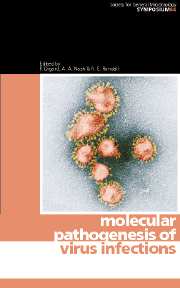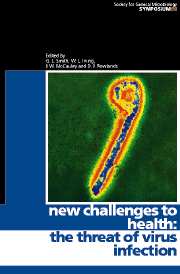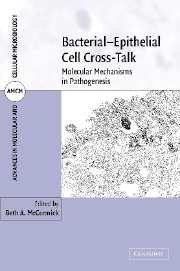Molecular Pathogenesis of Virus Infections
£70.99
Part of Society for General Microbiology Symposia
- Editors:
- P. Digard, University of Cambridge
- A. A. Nash, University of Edinburgh
- R. E. Randall, University of St Andrews, Scotland
- Date Published: April 2005
- availability: In stock
- format: Hardback
- isbn: 9780521832489
£
70.99
Hardback
Looking for an inspection copy?
This title is not currently available on inspection
-
Virus and prion diseases remain a major public health threat, in both developed and developing countries. The worldwide HIV pandemic is but one example of a newly emerged virus disease; other potential threats come from exotic viruses such as SARS, Ebola and Hantaan viruses. Older human viruses such as influenza, papilloma, herpes and the hepatitis viruses still cause major health problems. Furthermore, as well as causing acute infections, some viruses may also establish persistent infections which can lead to the development of chronic diseases, including cancer. This symposium book covers central factors that influence the pathogenicity of virus and prion infections. Topics range from innate and adaptive immune responses and virus evasion of host defences to details of selected virus∆host interactions, including those involving dengue virus, HIV, influenza viruses, coronaviruses, hepatitis C virus, herpesviruses, papillomaviruses, African swine fever virus and poxviruses.
Read more- Covers both newly emerged diseases such as HIV as well as older diseases such as influenza
- Considers both actute and chronic infections
- Presents the most up-to-date, state of the art findings
Customer reviews
Not yet reviewed
Be the first to review
Review was not posted due to profanity
×Product details
- Date Published: April 2005
- format: Hardback
- isbn: 9780521832489
- length: 358 pages
- dimensions: 234 x 157 x 22 mm
- weight: 0.698kg
- contains: 30 b/w illus. 9 colour illus. 7 tables
- availability: In stock
Table of Contents
Preface
1. Adaptive immune responses J. L. Whitton
2. T-cell responses and dengue haemorrhagic fever G. Screaton and J. Mongkolsapaya
3. The immune response to human immunodeficiency virus type 1 (HIV-1) E. Turnbull and P. Borrow
4. Persistent RNA virus infections C. M. Dixon, L. Breakwell, G. Barry and J. K. Fazakerley
5. Exotic virus pathogenesis S. Nichol
6. Molecular approaches to the pathogenesis of feline coronaviruses C. Dye and S. Siddell
7. The transmissible spongiform encephalopathies J. C. Manson and R. M. Barron
8. Influenza virus pathogenicity R. G. Webster, A. S. Lipatov and E. Hoffmann
9. RNAi as an antiviral mechanism and therapeutic approach R. P. van Rij and R. Andino
10. Neurons and host immunity conspire to maintain herpes simplex virus in a latent state M. L. Freeman, V. Decman and R. L. Hendricks
11. Hepatitis C virus disruption of interferon signalling pathways and evasion of innate intracellular antiviral defences S. M. Lemon and K. Li
12. Human papillomaviruses and their effects on cell cycle control and apoptosis L. Gray, C. Jolly and C. S. Herrington
13. Intracellular antiviral defence mechanisms: the power of interferon-regulated restriction factors O. Haller, F. Weber and G. Kochs
14. Poxvirus immune evasion A. Alcami
15. Evasion of host defence systems by African swine fever virus L. K. Dixon
16. Murid herpesvirus 4 as a model for gammaherpesvirus pathogenesis J. P. Stewart, D. Hughes, L. Roaden and B. Ebrahimi
Index.
Sorry, this resource is locked
Please register or sign in to request access. If you are having problems accessing these resources please email [email protected]
Register Sign in» Proceed
You are now leaving the Cambridge University Press website. Your eBook purchase and download will be completed by our partner www.ebooks.com. Please see the permission section of the www.ebooks.com catalogue page for details of the print & copy limits on our eBooks.
Continue ×Are you sure you want to delete your account?
This cannot be undone.
Thank you for your feedback which will help us improve our service.
If you requested a response, we will make sure to get back to you shortly.
×





